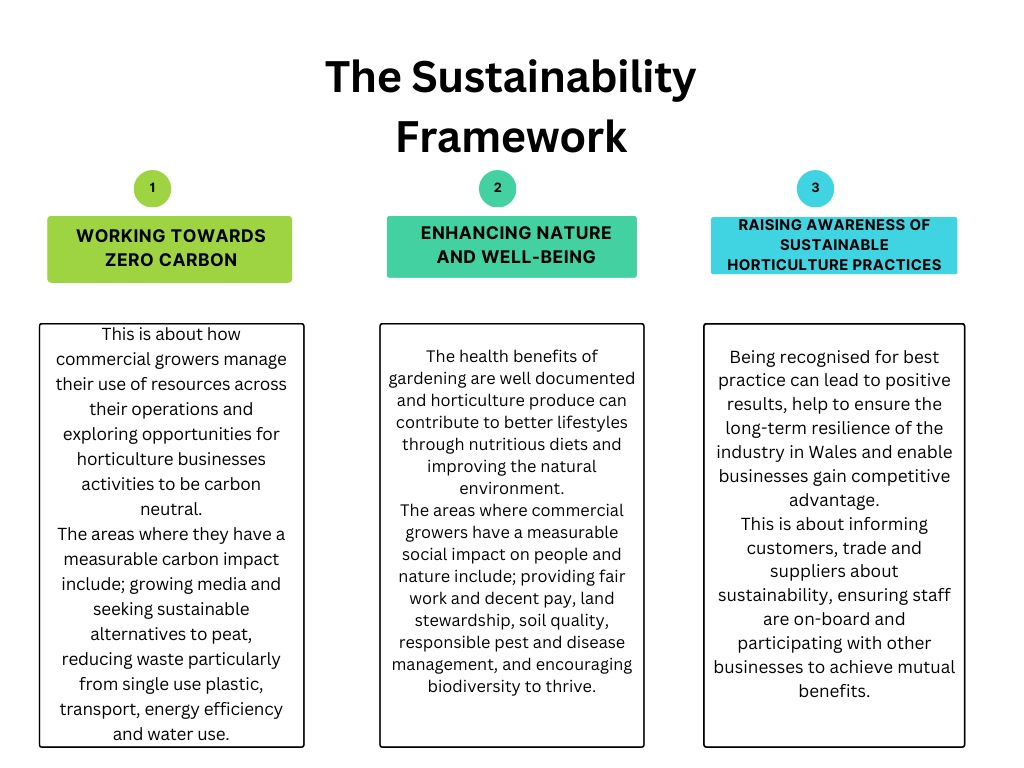Tyfu Cymru has initiated this sustainability framework in response to a need identified through ongoing work with a focussed industry group of commercial growers in Wales. Each grower involved has undertaken a sustainability audit and set their own action plans that contribute to the shared goals of the sustainability framework.
This work is ongoing and next steps include defining meaningful targets, and opening-up to more commercial growers to indicate how their activities respond to the climate crisis, Wales Well-Being Goals and emerging policy for how payments for public goods will be made via the Sustainable Farming Scheme.

All sectors of the Welsh economy face significant challenges from our changing economy and climate. We see this as a crucial aspect for how we support the horticulture industry to adapt in a balanced way. This must make sense both environmentally and commercially, to respond the climate crisis and the significant and growing demand for sustainable produce from Wales.
It is also a step towards capturing the true value of the horticulture industry in Wales and its vital contribution towards the Welsh Government’s vision for a low carbon economy and emerging policy for the Sustainable Farming Scheme with Wales Well-Being Goals at its core.
A next phase is planned to include defining meaningful targets for the sustainability framework and then opening-up to more commercial growers from Wales to become involved.
Find out more about the framework action areas and useful resources, including how to join in the below
Several businesses in the cluster grow peat free with several others working towards this goal. For some the challenge is the availability of reliable alternative growing media, for others the risks of production losses are a barrier to change. Working collectively means agreed peat reduction targets can be set and progress can be made over time.
Operating a closed loop packaging system, whereby suppliers collect and reuse pots and trays, is an ideal way to prevent plastic waste from single use packaging. However, this isn’t always practical for small businesses who are often left to dispose of used pots and packaging. Other routes are to reprocess plastic into upcycled products. Both options are more easily explored collectively where volumes are higher.
Good water management is vital to maintain yields, ensure quality, stay ahead of legislation and keep production costs down. This is commonly done by combining mains water use with abstracting, collecting and recycling water. However, these alternatives also generate costs due to storage and treatment needs. The changing climate may mean periods of drought and plant stress, leading to loss in production and increased plant disease. Growers should consider how to use water wisely, both now and in the future.
A healthy soil is vital for growers because it holds and regulates water and nutrients, and provides support for plants and helps maintain healthy root systems. Whilst synthetic substrates and hydroponics are emerging as commercial growing methods both are relatively new, and soil-grown plants are predominant. Beyond producing plants, healthy soils have a fundamental role in environmental quality preventing flooding through regulating water run-off, filtering pollutants, recycling nutrients and soil acts as a carbon sink which is crucial in reducing climate change.
The control of pests and diseases is essential in producing quality plants and the science and technology surrounding this is growing rapidly. Chemical controls are becoming more expensive and less desirable due to their environmental damage. Integrated Pest and Disease Management using natural, bio-controls is becoming widely used in nurseries. Advances are also being made in disease diagnostics which enable targeted control measures. Working collectively means agreed chemical reduction targets can be set and progress can be made over time.
Horticultural businesses are dependent upon skilled labour but a shortage of skilled workers means it is increasingly vital to attract talent to the industry, by promoting the benefits of working in horticulture, and by providing secure and meaningful work. Several businesses assign staff responsibilities to good environmental practices and pay the Real Living Wage. Identifying and working with suppliers to operate in responsible ways, sharing knowledge and resources with other businesses and involving the local community are all ways are taking responsibility.
Advances in technology and new growing methods provide opportunities for horticulture businesses to improve their efficiency and increase their productivity. Hydroponics is one method that enables plants to be grown indoors, giving growers control over lighting, water and nutrients required whilst minimising use of pesticides.
The circular economy is all about keeping resources in use for longer. Sharing resources with nearby businesses, converting by-products and waste into useable resources and rethinking conventional business models where, for example, trees and plants are rented and returned to the nursery to continue to be replanted and to prevent waste.
All businesses rely on resources such as energy and transport. This generates greenhouse gas emissions so these resources need to be carefully managed to keep emissions down. Several businesses in the cluster have some renewables installed and the rising costs and availability of fossil fuel derived energy will likely necessitate a switch towards renewables and away from diesel and petrol delivery. The production of pesticides and fertilisers is energy intensive and oil derived so alternatives will be needed. Measuring carbon footprints individually and collectively can demonstrate how the sector contributes to global reduction targets for Net Zero.
Sustainability is a hot topic for horticulture with buyers and consumers increasingly seeking out businesses that demonstrate positive environmental practices and social impacts. This masterclass introduces a tried and tested approach to equip you with the practical know-how to build sustainability into your horticulture business. From peat-free growing, avoiding plastic packaging, through to the efficient use of water and energy, and how you engage with staff, suppliers, and customers
